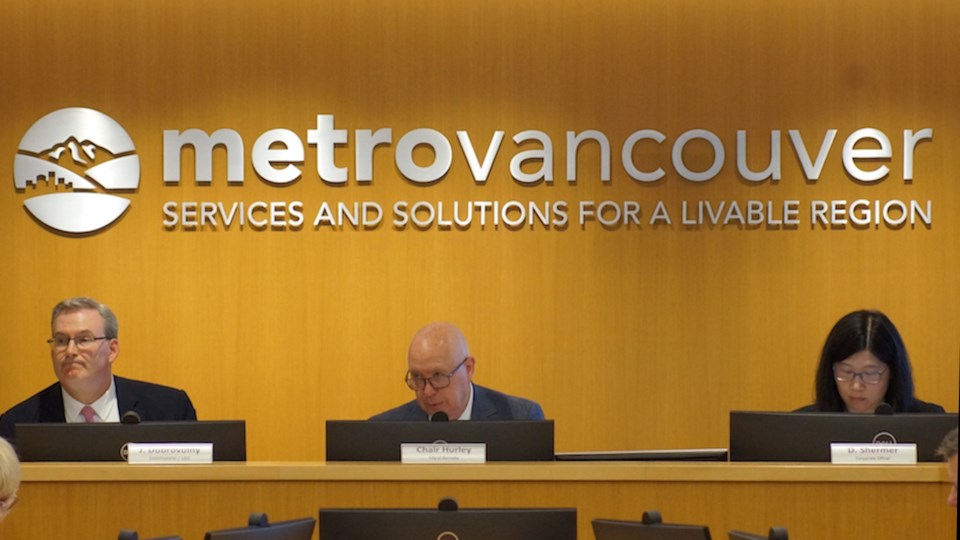Metro Vancouver Regional District board directors should not be paid less but rather take on fewer responsibilities as a “culture of heightened mistrust and frustration” builds within the organization, according to recommendations from consulting firm Deloitte Canada.
Metro Vancouver board chair Mike Hurley hired Deloitte in February to conduct a governance review in the wake of growing discontent from members of the public who were this month handed a 25.3 per cent hike on average to their regional property taxes and utility fees. Part of the sizable hike was to pay for a nearly $3-billion cost overrun for the North Shore Wastewater Treatment Plant.
“Challenges with the North Shore Wastewater Treatment Plant program and the subsequent funding impacts have created an environment of extreme tension within the Board and with municipalities,” states the report to be tabled to the board on May 23.
Deloitte examined the structure of the board, how its directors are compensated, the roles and competencies expected of directors and how the board is informing the public.
The firm was assisted by an advisory panel consisting of former B.C. premier Glen Clark; former B.C. finance minister Colin Hansen; Martin Thibodeau, regional president of the Royal Bank of Canada (TSX:RY); Jennifer Podmore Russell, chief development officer of Nch’ḵaỷ Development Corporation; and Diana Vuong, former CFO and vice-president, finance, at the Vancouver Airport Authority.
Hybrid subsidiary boards could ease burden on directors
Deloitte concluded the board of directors has become “large and unwieldy” with “increasing tensions and political differences” at the table.
Among Deloitte’s key recommendations is a so-called “hybrid board.”
The board currently consists of 41 directors who are elected officials appointed from the Metro Vancouver’s 23 respective local jurisdictions; this is called the federation model and each member has a weighted vote based on their jurisdiction’s population.
Vancouver has seven directors and 23.4 per cent of the voting power.
But directors oversee three other boards: housing, water, and sewerage and drainage.
Technically, Metro Vancouver is comprised of four separate entities overseeing such operations.
Deloitte envisions creating separate subsidiary boards for the Greater Vancouver Water District and the Greater Vancouver Sewerage and Drainage District entities, consisting of directors from the main district board and independently appointed members.
The goal, said Deloitte, is to “introduce a balance of professional experience, and enhance decision-making and risk management.”
A problem that the hybrid board may address is the constant turnover of directors every four years that has caused problems for staff when communicating long-term objectives, such as the need to renew utility infrastructure, Deloitte noted.
The quadrennial municipal election cycle creates a high turnover of board members, resulting in the loss of institutional knowledge.
Another issue identified as problematic is how directors become increasingly conflicted in their roles, between serving their own municipality and serving the region as a whole. For example, a costly regional project may not serve a municipality directly.
“The challenges for Board directors to balance the interests of both their rapidly growing electorate as well as those of the broader Metro Vancouver region will only become more politically and legally challenging – creating an untenable conflict between their fiduciary duties at times,” the report states.
Other board models suggested by Deloitte include having only one director per jurisdiction or capping the board at 34 members.
Deloitte also suggests “the corporatization or privatization of the utility entities” entirely, although such a change would “require significantly more investigation, consultation and analysis.”
Regardless of what structure is chosen, Deloitte further suggests appointment of an independent non-elected chair for a four-year term.
Keep $547/meeting fee but make changes around the edges
As for a change to remuneration, which was raised earlier this year by Port Coquitlam Mayor Brad West, Deloitte recommended directors continue to be paid $547 per meeting, after comparing board remuneration to BC Ferries, BC Hydro and TransLink.
Deloitte does, however, suggest the double pay for meetings over four hours be eliminated.
Additionally, Deloitte recommended changes to committee pay structures, replacing the retainer for committee chairs with a double meeting fee.
The board should also consider “a threshold for non-payment of the meeting stipend – perhaps for those attending Zoom meetings of less than 30 minutes hour in duration, or some other similar minimum threshold. This could incentivize the deferral or consolidation of these meetings,” the report said.
Meanwhile, Deloitte suggested the $109,337 salary for the board chair is “reasonable.”
While some savings can be obtained, Deloitte concludes “the solution, however, cannot be to reduce compensation to reflect public dissatisfaction with the governance of the Board, but to improve the governance to justify the remuneration.”
In addition to board structure and remuneration, Deloitte touched on information sharing at the board level, concluding: “Litigation and confidentiality around closed information is restricting the free flow and transparency of this information, resulting in further frustrations. Finding mechanisms to balance the need for confidentiality and the need for transparency will be paramount.”



